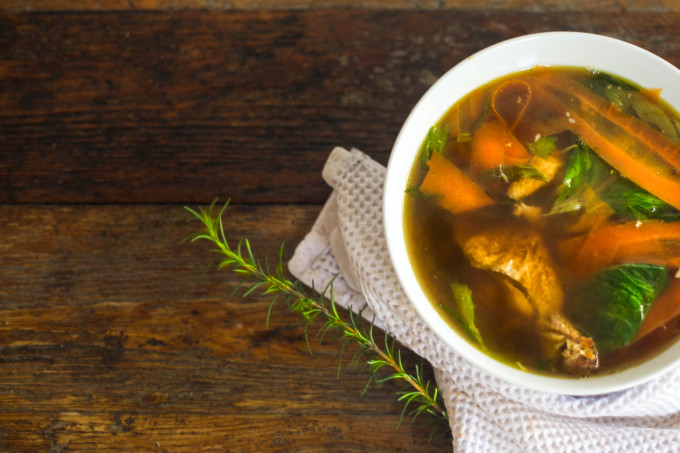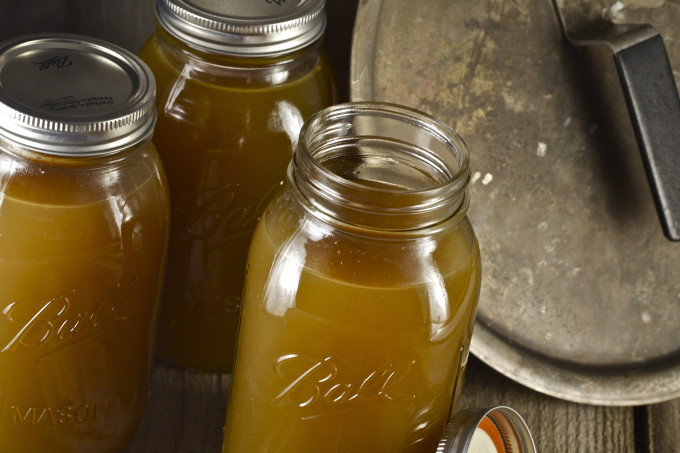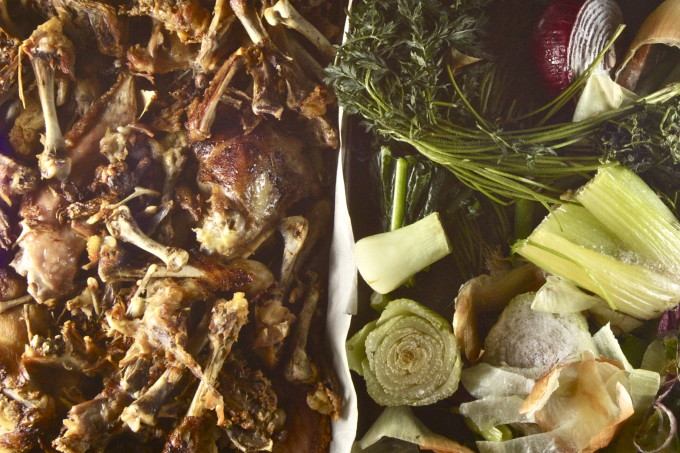Every food culture prides itself on its version of chicken soup. It is as basic and basic a recipe as cooking. But, most people have no clue how exceptionally delicious this dish can be. Learning the skill of making a rich, flavourful soup out of chicken, vegetables, and water is a goal worth pursuing. But it takes an obsessive commitment to a few time-tested methods. Now, if you’re on board, it’s time to take stock. Let’s make delicious chicken soup.

A rich, dark broth is the key to this Cajun recipe for hearty chicken soup. (All photos: George Graham)
With all my writing about Cajun cooking, there’s one question I never tire of hearing—”Do you make your own chicken broth?” And my answer is always a question – “Why wouldn’t I?” I love making stock because it’s an introduction to the heart of Cajun cooking – a tutorial about everything pure and simple and so good about my passion for the high quality ingredients that go into every Cajun recipe.
Ditch those little jars of foil-coated chicken cubes you bought in 1987 and ditch the sodium-laden carton of diluted chicken broth you bought for a whopping four bucks. These expensive “convenience” products are a ruin for many soups, watered down kombu, flavorless stews and casseroles, and you get the message right. Forgive me for preaching, but this short lesson will take your dishes from the mediocre to the magical. And it’s a low cost – an investment of time, not money.
While the process of making chicken gravy is simple, I never short on the art and beauty of the process. It cleanses my soul, perfumes my world and, to some extent, brings order to the chaos of everyday life, but enough philosophy. Fresh, full-flavor chicken broth can elevate every Cajun recipe you make with it. It’s my secret weapon.

Dark chicken broth – the magical elixir in this delicious chicken soup.
Let’s go back for a moment. As an amateur cook I don’t have access to a restaurant kitchen pantry so I need to plan my stock making with careful strategic maneuvers. Place each scallion end, woody asparagus stalk, carrot butt end or leftover onion peel into a freezer bag. Over the course of a month or two, these things add up and the only reason to buy that garage-hit freezer. Also, every leftover chicken carcass or leftover turkey is always kept in the pot. When chicken wings, neck, or thighs are sold out, I stock them. Chicken feet are rich in cartilage, so look for an Asian or Latino meat market.
Then the day comes. My love effort begins with a cup of morning coffee latte while I put away my frozen treasure trove. Chicken parts, pieces, bones and skin are placed in an oven tray. Roast at 400°F until just browned and not burnt.

The remaining ingredients go into this Cajun Dark Chicken Stock recipe – the secret to this delicious chicken soup.
A variety of vegetables – onions, carrots, and celery are a must – put the chicken in the oven to roast and then finally in a large pot filled with enough cold water to cover the ingredients. Always start with cold water to release the proteins in the collagen of the chicken bones that create the full gelatinous richness of a well-made broth. Turn up the heat and let it simmer gently–never burst–all afternoon and a half into the night. Don’t move. Skim the foam and scum from the top, but never stir. Cool, strain, and refrigerate overnight.
Now, let’s make a delicious chicken soup.
Delicious chicken soup
total time
First you make an inventory. The stock making can be increased or decreased depending on your needs and the size of your stock pot. I always make more stock than I will need and freeze the rest. It will become one of your most important culinary assets.
Recipe by: George Graham – AcadianaTable.com
Serve: 4 to 6
ingredients
Dark chicken stock
- 6 pounds chicken bones (the back, neck, wings, thighs, and legs are best) or leftover chicken carcasses you have stored
- 4 tablespoons of vegetable oil
- 4 large yellow onions, cut into quarters
- 4 large carrots, coarsely chopped
- 6 celery sticks, coarsely chopped
- 2 sprigs of fresh thyme
- 4 cloves of garlic
- 1 cup parsley, leaves and stems packed tightly
- 1 tablespoon black pepper
- 4 bay leaves
- 3 pounds chicken feet, cleaned
- 1 1/2 gallons (24 cups) cold water
chicken soup
- 12 cups of dark chicken broth
- 6 skinless chicken legs
- 1 large yellow onion, diced
- 2 stalks celery, diced
- 2 large carrots, peeled and shaved into strips
- 1/2 cup of soft green leafy vegetables, such as celery leaves or spinach
- 1 tablespoon minced fresh garlic
- A cup of chopped parsley
- 1 tablespoon chopped fresh rosemary
- 1 tablespoon of chopped fresh thyme
- 2 lbs skinless chicken breast, cut into bite-size pieces
- 2 lbs skinless chicken thighs, cut into small pieces
- kosher salt
directions
Dark chicken stock
- Preheat the oven to 400 degrees Fahrenheit.
- Dry all chicken pieces with paper towels. Place the chicken on metal trays with 2 tablespoons of oil. Rub the pieces gently. Place the trays in the oven and roast until browned (not burnt), about 90 minutes.
- On another tray, we put the onions, carrots and celery and rub with the remaining oil. Place in the oven and roast until browned (not burnt), about 30 to 40 minutes.
- In a large saucepan over medium heat, add chicken bones and vegetables. Remove the boil from each pot with a little water and scrape up the bits and pieces with a spoon. Add to pot along with thyme, garlic, parsley, peppercorns, bay leaves, and all fresh chicken legs. Add cold water. Bring to a simmer, reducing heat to low just before it starts to boil. Continue to boil the broth for 8 hours, periodically skimming the surface of the fat and dirt. Turn off the heat and let the broth cool.
- Using a fine-mesh strainer (or cheesecloth) over a large bowl, pour in the broth, making sure to strain out and discard all bones and solids. Put the broth in the fridge overnight.
- Remove the broth from the refrigerator and using a large metal spoon, remove and discard the cap of fat that forms on the top. The stock will be frozen and almost jelly-like in texture. This is a sign that the collagen has come out of the chicken’s bones and feet. Put the broth into the clean pot with a spoon and bring it to a simmer on the stove. Continue to cook uncovered and reduce broth to about 1 gallon (16 cups). Let the stock cool.
- Over a large bowl with a fine-mesh strainer (or cheesecloth), strain the broth one last time to remove any residue or particles. Use broth immediately or divide into containers with airtight lids (I use 1-quart mason jars) and freeze until ready to use. Another option, if you think you’ll be storing the broth for several months, is to leave a layer of fat on top. Like paraffin in a jam jar, when solidified this layer of chicken fat will seal the broth for preservation. Additionally, I like to freeze a portion of the stock in ice cube trays and once frozen, put them in freezer storage bags. Then you can take them out one by one to make sauce or add to vegetables, etc.
chicken soup
- In a large saucepan over medium heat, add the dark chicken stock along with the chicken legs and simmer for 20 minutes. Add the vegetables and herbs along with the breast and thigh meat and simmer for 15 minutes, until the chicken is fully cooked. Season with salt to taste. Serve in large bowls, making sure to evenly distribute the chicken, with a whole chicken thigh in each bowl.
notes
I don’t add tomato paste or wine to chicken broth, but I do add it to beef broth (another post). You’ll notice no salt, ground black pepper (peppercorns only), or any spicy Cajun seasoning of any kind. It is important to maintain the integrity and purity of the broth without any overt seasoning ingredients that compete with the flavor of the chicken. Seasonings (including salt) should only be used in the finished dish. Freeze leftover chicken (or turkey) carcasses and the skins and stems of vegetables to make this gravy. You will be amazed at how quickly it accumulates. If using fresh whole chicken pieces, remove most of the meat from the thighs and breast pieces and reserve for another use. (It’s okay if the bones are still clinging to the meat.)
3.2.2708
Your seat at the table: If you love this Cajun cooking story then this Cajun recipe is for you aAccept my personal invitation to sign up by entering your email at the bottom or top right of this page. It is fast and painless. You’ll receive an email alert and be the first to see when new Cajun cooking stories and Cajun recipes are added.
Thanks, George.